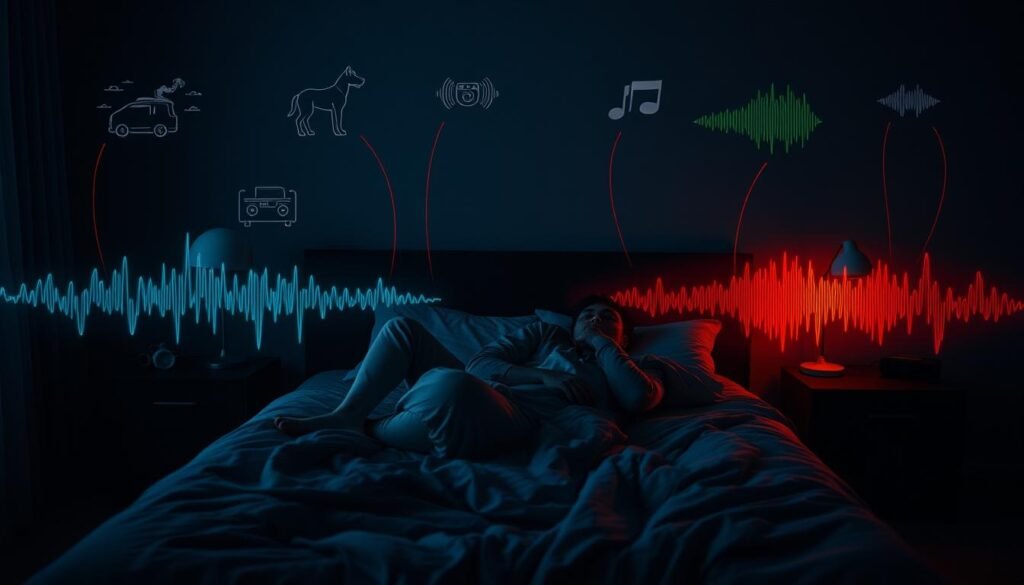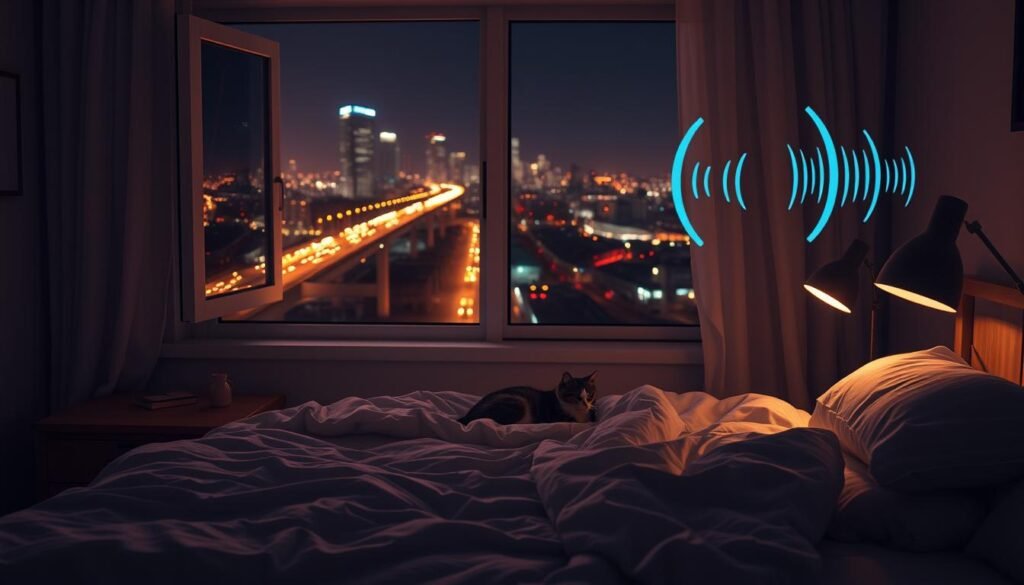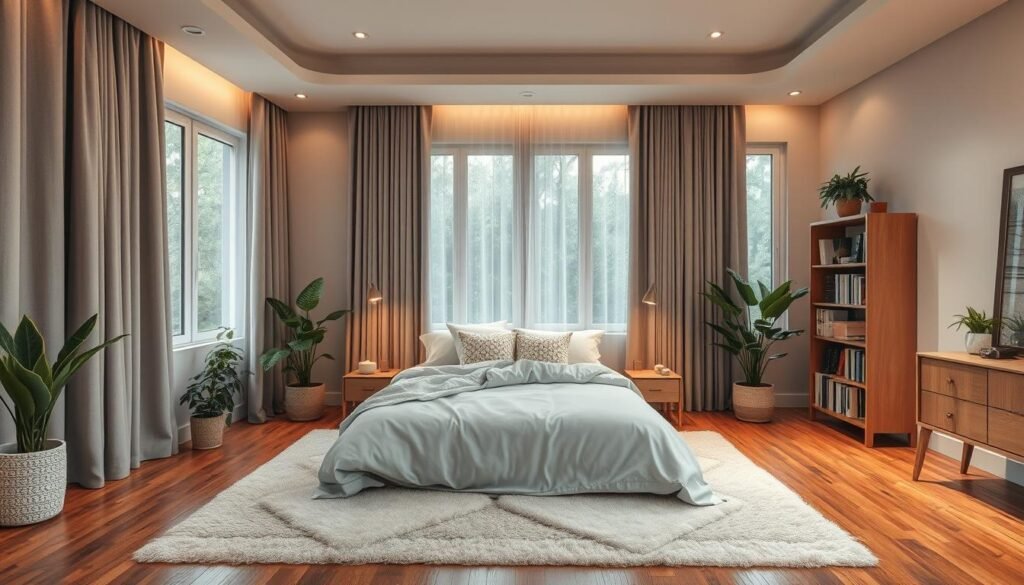Did you know noise around us can affect how well we sleep? Studies show nighttime noise can mess with our sleep patterns. It increases light sleep but cuts down on REM and deep sleep stages. This can cause big health problems, like high blood pressure and heart disease.
With more noise pollution today, it’s key to know how sounds can cause insomnia. This knowledge helps us keep good sleep habits and stay healthy. Sounds like traffic or outdoor noises can keep us up at night. Finding these sounds and using tips to block them can make sleep better. Just imagine how peaceful it’d feel to sleep in a quieter place.
Key Takeaways
- Environmental noise can disrupt sleep and increase stress hormones.
- Common sources of noise pollution include traffic, neighbors, and weather-related sounds.
- Poor sleep from noise exposure is linked to serious health complications.
- Effective sound masking strategies, like white noise, can improve sleep quality.
- Establishing good sleep habits is vital for preventing insomnia.
- Identifying and minimizing insomnia-causing sounds is crucial for better sleep.
- Seeking professional help may be necessary for severe insomnia cases.
Understanding Insomnia and Its Triggers
Insomnia means trouble falling asleep, staying asleep, or waking up too early. It hurts sleep quality a lot. About one-third of adults have insomnia symptoms, and that number jumps to 75% in older adults. It’s more common in women and the elderly. Young and middle-aged African Americans also have a higher risk.
Many things can trigger insomnia, like noise, stress, and how we live. Long-term sickness and mental health issues can make it worse. Insomnia can affect your mood and thinking skills during the day.
Knowing about insomnia helps in finding out what causes it and how to treat it. Cognitive Behavioral Therapy for Insomnia (CBT-I) is often used first for chronic insomnia. It’s important to keep good sleep habits to lessen symptoms and better your sleep quality. Check out Sleep Foundation for more ways to manage insomnia.
Common Insomnia-Causing Sounds and How to Avoid Them
Many people have trouble sleeping each year. Sounds around us play a big part in this problem. We’ll look at how traffic, neighborhood activities, and seasonal noises affect sleep.
Traffic Noise and Sleep Disturbances
Traffic noise is a big reason why some can’t sleep well. The honking, engines, and vehicles moving can break our sleep. Studies show that these noises make us wake up more and spend too much time in light sleep. To help, you might want to soundproof your room. You could use double-glazed windows or heavy curtains.
Neighborhood Sounds and Their Impact
Barking dogs or parties can also ruin sleep. Such noise is hard to predict, making it hard to sleep well. Talking to your neighbors about keeping it down during certain hours can help. Or, you could use noise-canceling methods to keep things quiet. Having agreed quiet times can make the whole area more peaceful.
Seasonal and Weather-Related Noises
Seasonal sounds like rain or wind can disturb our sleep too. Not knowing when these sounds will happen can make us anxious about sleeping. Using white noise machines or nature sounds can help cover up these sudden noises. These help make a soothing environment for better sleep, cutting down on insomnia-causing sounds.

| Type of Sound | Impact on Sleep | Possible Solutions |
|---|---|---|
| Traffic Noise | Increases light sleep; causes frequent awakenings | Soundproofing windows; using white noise machines |
| Neighborhood Sounds | Disrupts sleep continuity; leads to increased anxiety | Community discussions about noise; noise-cancelling devices |
| Seasonal Noises | Unpredictable interruptions; creates anxiety | Nature soundtracks; bedroom sound masking |
How Environmental Noise Affects Your Sleep
Noise around us, especially at night, affects our sleep and health. Loud sounds when we sleep can mess up our body and mind. This can make us feel tired and stressed the next day.
Physical and Psychological Effects
Loud noise from things like cars can ruin our sleep. It can make our hearts beat faster as our body reacts to stress. This messes up the pattern of our sleep, making it hard to stay asleep. Feeling sleepy and cranky during the day, and having trouble thinking clearly are common. People living in noisy places don’t feel as good overall.
Long-Term Health Consequences of Sleep Disturbances
Being around loud noise for a long time is bad for our health. Studies show it can lead to high blood pressure in kids and old people. Night-time road noise can increase heart problems and even death. It can also cause serious illnesses like heart disease, stroke, and some types of cancer. Too much noise can also make us gain weight and get diabetes. It’s important to find ways to reduce noise around us to sleep better.

| Health Consequence | Condition | Exposure Type |
|---|---|---|
| Hypertension | Increased risk | Traffic noise at night |
| Cardiovascular disease | Higher incidence and mortality | Traffic noise |
| Sleep disorders | Impaired sleep quality | Nocturnal noise pollution |
| Obesity | Weight gain | Prolonged noise exposure |
| Type 2 diabetes | Increased risk | Chronic sleep disturbances |
Creating a Quieter Home Environment
Having a quiet home can make sleeping better. Many find their sleep interrupted by noise. Using certain strategies can make you feel more relaxed and healthy.
Soundproofing Techniques for Your Bedroom
Soundproofing your bedroom is key to blocking outside noise. You can seal openings, hang heavy curtains, and apply sound-absorbing materials. These steps make your room a peaceful place for sleep. For tips on soundproofing, check out this source.
Reducing Noise from Household Appliances
Household devices often make a lot of noise. Keeping appliances like fridges and ACs running smoothly makes your home quieter. Fixing them regularly and placing them correctly can lessen background noise. This helps make a calmer space for rest. Look for newer, quieter models when you buy next time.
Incorporating Soft Surfaces to Absorb Sound
Adding soft items to your room can also reduce noise. Think about getting rugs, cushioned chairs, and soft curtains. These not only look good but also cut down on echoes. They improve the sound quality of the room, making it more serene.

Knowing how to quieten your home is important if noise bothers you. Minor changes can greatly improve your sleep and health.
Effective Sound Masking Strategies
For those battling insomnia, effective sound masking strategies can greatly help. They often include White Noise Machines, different color noises, and natural sounds. These elements work together to build a calm sleeping space. This leads to improved rest.
White Noise Machines and Their Benefits
White noise machines are a favorite for people wanting better sleep. They create a steady sound that blocks out annoying background noise. This helps people fall asleep more easily. Studies show that white noise lets adults fall asleep quicker. This is true even in noisy places like hospitals.
These machines vary in price, so picking the right one is vital. It’s crucial to choose a device that you like and is safe. Some can be too loud and may harm your hearing over time.
Other Color Noises: Pink and Brown Noise
Pink and brown noise can also improve sleep. Pink noise is softer and may help you sleep more deeply. For those with tinnitus, brown noise’s deeper tones might be helpful.
Devices like the Sound + Sleep Mini provide these color noises. They let users find the perfect sound setting for sleep.
Using Natural Sounds to Promote Sleep
Natural sounds can also help you relax and sleep. Ocean waves or rain sounds have helped many people fall asleep. This type of Ambient Noise Reduction creates a peaceful atmosphere. It’s great for relaxing at night’s end.
To find more sound strategies for sleep, look into options like binaural beats. These may improve sleep and mood. You can discover more here.
Personal Tools to Combat Noise Pollution
In the quest for better sleep, using tools to fight noise helps a lot. Ear plugs and noise-cancelling headphones make sleeping easier. They help you get a peaceful night’s rest.
Choosing the Right Ear Plugs for Sleeping
Finding the best ear plugs for sleep is key. Good disposable ear plugs can lower noise by 15 to 30 decibels. They protect you from sounds that disrupt sleep. Loop Quiet earplugs are comfy and cut noise by up to 24 decibels. Loop Engage earplugs work well if you still want to hear some sounds. They let you talk to others while keeping things quiet.
Try different ear plugs to see which ones work best for you. Knowing how noise pollution affects sleep is important. Many have trouble sleeping because of noise. To learn more, check out the impact of noise pollution on.
The Role of Noise-Cancelling Headphones
Noise-cancelling headphones are another way to block out noise. They let you listen to calming sounds or music without outside noise. This can help you sleep better and stay asleep longer.
These headphones also prevent hearing damage from loud noises. They’re especially important in noisy cities. Using ear plugs and headphones can improve sleep and health.
| Type of Ear Plug/Headphone | Noise Reduction (dB) | Best For |
|---|---|---|
| Loop Quiet Earplugs | Up to 24 | High Noise Environments |
| Loop Engage Earplugs | 16 | Social Situations |
| Noise-Cancelling Headphones | Varies by Model | Listening to Music/White Noise |
Establishing a Calming Bedtime Routine
A well-planned calming bedtime routine improves sleep. Following a consistent sleep schedule helps the body get ready for bed. Also, making your sleeping area relaxing can block out unsettling noises. Doing soothing activities before bed helps you fall asleep more easily.
Importance of a Sleep Schedule
Sticking to a regular sleep routine is key for good sleep. Try starting your bedtime routine 30 to 60 minutes before you go to sleep. Activities like deep breathing, relaxing your muscles, or gentle yoga can help reduce stress. Writing in a journal can also help you unwind by organizing your thoughts or tasks for the next day.
Creating a Relaxing Sleep Environment
Creating a calming sleeping space can improve your sleep. The best environment is cool, dark, and quiet. It’s good to keep the room temperature between 65 to 68 degrees for better rest. Lowering lights, organizing your space, and using calming scents can make your bedroom feel peaceful. Taking a warm bath before bed can also encourage sleepiness.
For a calming atmosphere, try listening to relaxing music or sounds. These sounds can shift your focus from stress to relaxation. Reading a book in another room under gentle lighting works too. By simplifying your bedtime routine and avoiding screens, you can strengthen your bedtime routine for better sleep quality.
Consulting Professionals for Severe Cases
Millions of people worldwide suffer from insomnia, impacting their physical and mental health. While some can manage mild symptoms by changing their lifestyle, others with persistent insomnia need more help. They should seek help from a qualified sleep specialist for proper insights and treatment.
When to Seek Advice from a Sleep Specialist
Knowing when to see a sleep specialist is key for those with sleep problems, especially insomnia. Issues like having trouble falling asleep, staying asleep, or waking up too early are signs. If you’ve struggled with insomnia for over a month or it’s badly affecting your daily life, getting evaluated and treated is crucial. Conditions like chronic pain, sleep apnea, and certain medications can worsen sleep. A specialist can offer solutions that really target these problems.
Understanding Sleep Disorders Beyond Noise
Sleep disorders are not just about noise. They can involve mental and medical issues. Stress, anxiety, and depression can badly disrupt sleep. A sleep specialist can identify and treat comorbid insomnia, which may exist alongside conditions like depression or chronic pain. Treatments could include cognitive behavioral therapy or specific medications. Experts determine if poor sleep habits, medications, or age-related changes are to blame. For more details on how specialists help with insomnia, see this resource.
| Sleep Disorder | Common Symptoms | Recommended Specialist |
|---|---|---|
| Insomnia | Difficulties in falling/staying asleep, daytime sleepiness | Sleep Specialist |
| Obstructive Sleep Apnea | Loud snoring, gasping for air during sleep | Otolaryngologist |
| Restless Legs Syndrome | Uncomfortable sensations in legs, urge to move | Neurologist |
| Narcolepsy | Excessive daytime sleepiness, sudden sleep attacks | Pediatrician, Sleep Specialist |
| Chronic Pain | Difficulty maintaining sleep due to discomfort | Pain Management Specialist |
Conclusion
Dealing with noises that cause insomnia is key to sleeping better. Stress, anxiety, and noises around us can disrupt our sleep. Using strong measures to fight insomnia is important. By soundproofing rooms and using personal tools, we can lower the noise at night. This helps create a quieter place to sleep.
A calm bedtime routine helps us sleep deeper and feel refreshed. Knowing when to get help for long-term insomnia matters too. A study shows that city noise affects our sleep. It says urban policies should consider noise control to improve sleep for everyone. Making changes in behavior and where we live can help lessen sleep problems from noise like traffic.
We can make our sleeping area calm to improve sleep. By changing our daily habits and our surroundings, we can fight insomnia. Also, seeing a sleep expert when needed is a good step. To learn more about how insomnia and noise are connected, check out this detailed study.